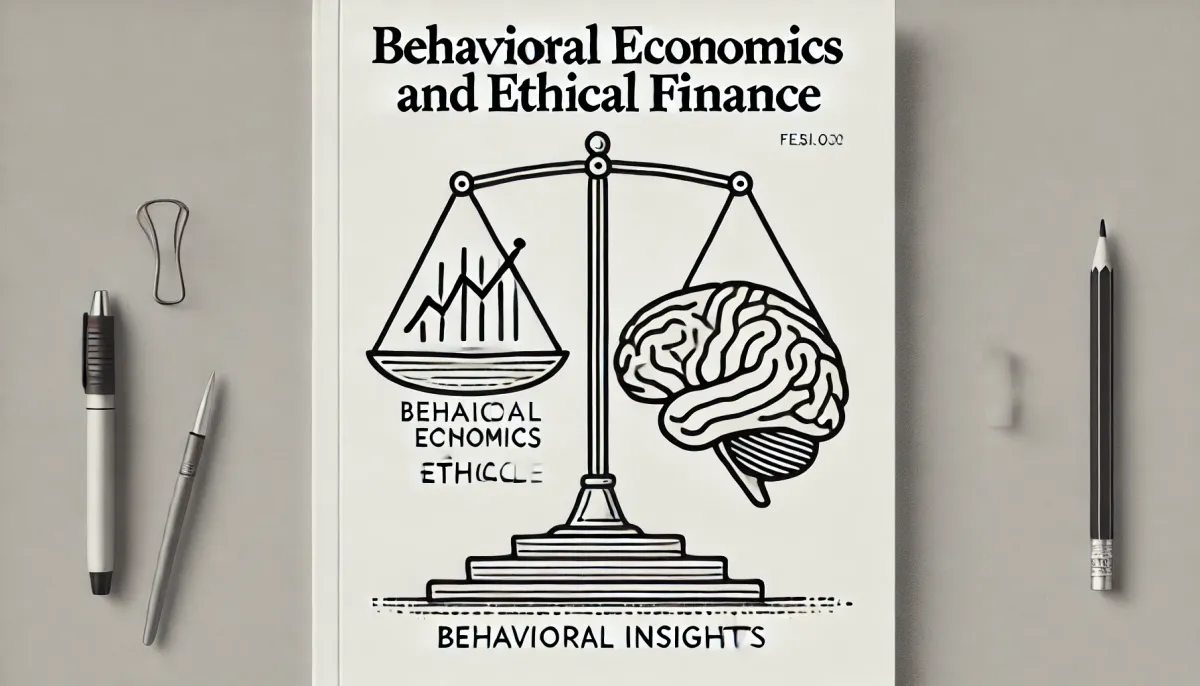In the world of finance, numbers are often seen as objective, unbending facts. Yet, behind every financial decision is a human element—our biases, emotions, and values. Behavioral economics, which explores the psychological factors shaping our economic decisions, has revealed just how far we are from making purely logical choices. Ethical finance, on the other hand, introduces a moral compass to financial decisions, ensuring they serve not only personal interests but also the greater good. These two fields find an intriguing intersection in Islamic finance, which has embedded social welfare, fairness, and shared responsibility at its core for centuries.
Let’s explore how the insights of behavioral economics can be applied to make finance more ethical, impactful, and human-centered—and how Islamic finance provides a model for these ideals.
1. How Behavioral Economics Sheds Light on Real-World Decision-Making
Behavioral economics challenges the traditional view that people are rational decision-makers. In reality, our financial choices are driven by psychological factors that often lead us astray. Here are some common biases that shape our financial lives:
- Loss Aversion: We hate losing even more than we love winning, which makes us overly cautious at times. Behavioral economists Daniel Kahneman and Amos Tversky found that the pain of losing $100 is roughly twice as intense as the pleasure of gaining $100.
- Herd Behavior: Remember the GameStop frenzy? This is a perfect example of herd mentality in finance—following the crowd despite personal doubts or better knowledge. This behavior has contributed to market bubbles, creating instability.
- Present Bias: Humans have a strong tendency to favor immediate rewards over long-term benefits, which can lead to impulsive spending and under-saving for the future.
Recognizing these biases helps us understand why people make choices that might not align with their long-term goals. Behavioral economists use this understanding to design “nudges” that guide people towards better financial decisions without restricting their freedom.
2. The Heart of Ethical Finance: Profits with Purpose
Ethical finance moves beyond traditional profit-seeking to consider how financial choices impact society and the environment. The rapid rise in ESG (Environmental, Social, and Governance) investing reflects a global shift toward finance with purpose.
- Environmental Stewardship: Investors are increasingly supporting businesses that prioritize sustainable practices.
- Social Responsibility: Many investors now look for companies that practice fair labor standards and contribute to community well-being.
- Good Governance: Ethical finance emphasizes transparent leadership and accountability, essential for building trust.
Ethical finance isn't just a trend; it’s transforming the industry. In fact, global ESG assets are projected to surpass $50 trillion by 2025.
3. Islamic Finance: A Time-Tested Model for Ethical Finance
Islamic finance, grounded in Shariah principles, offers a longstanding model for ethical finance. It prioritizes social welfare, equity, and shared responsibility through its unique financial structures.
Key Islamic Finance Principles:
- No Riba (Usury): Charging or earning interest is forbidden, as it can lead to exploitative practices.
- Risk Sharing: Both profits and losses are shared equitably among parties, fostering a sense of mutual responsibility.
- Asset-Backed Financing: Islamic finance requires real economic activity behind transactions, ensuring investments serve a tangible purpose.
- Avoiding Gharar (Uncertainty): Contracts should be free from excessive uncertainty to protect all parties involved.
These principles encourage transparency, ethical behavior, and social responsibility—values that align naturally with behavioral economics.
4. Practical Examples of Ethical Finance in Action
Islamic finance offers unique financial structures that naturally address common cognitive biases, promoting fairness and reducing the psychological strain of financial decisions. Here are a few practical examples:
- Mudarabah (Profit-Sharing Partnerships): In this arrangement, one party provides capital while the other offers expertise. Profits are shared, but losses are borne solely by the capital provider. This structure rewards effort and promotes prudent decision-making without the stress of loss aversion for both parties.
- Musharakah (Joint Ventures): Both parties contribute capital and share profits and losses based on their initial investment. This model is a powerful antidote to herd behavior, as both parties commit to the partnership’s success rather than short-term gains.
- Takaful (Cooperative Insurance): Unlike conventional insurance, Takaful operates on a shared-risk model, where policyholders contribute to a common fund to cover losses. This reduces the present bias by creating a financial safety net without profit-driven premiums.
5. Chart: How Behavioral Economics Biases Compare in Conventional vs. Islamic Finance
| Behavioral Bias | Conventional Finance | Islamic Finance |
|---|---|---|
| Loss Aversion | Often leads to excessive debt to cover losses. | Risk-sharing models minimize individual loss burden. |
| Herd Behavior | Speculative bubbles and trends shape decisions. | Ethical guidelines promote careful, deliberate investment. |
| Present Bias | High-interest loans incentivize quick returns. | Prohibition of riba encourages long-term planning. |
| Status Quo Bias | Default settings often maximize yield for institutions. | Ethical defaults prioritize community and societal welfare. |
This comparison highlights how Islamic finance naturally addresses common financial biases, offering an ethical and more balanced approach to financial well-being.
6. Nudges for Better Financial Behavior
Behavioral economists suggest nudges—simple prompts that encourage positive financial habits without forcing choices. Ethical finance and Islamic finance provide excellent examples of how nudges can be used effectively:
- Defaulting to Ethical Investments: In some retirement funds, socially responsible investments are the default option, which boosts participation in ethical investing.
- Micro-Saving Features: Automated small savings nudges make it easier to build a habit of saving without the overwhelming pressure to set aside large amounts.
Nudges like these encourage long-term thinking and responsible financial practices, aligning perfectly with Islamic finance’s goals of financial stability and social welfare.
7. A New Era of Finance: Why Behavioral and Ethical Finance Matter
As we continue to unravel the biases and behaviors that shape our financial choices, it’s clear that the future of finance needs to consider both human psychology and social impact. The convergence of behavioral economics and ethical finance can create a system that not only supports individual financial goals but also contributes to a just and sustainable society. Islamic finance, with its principles of fairness, transparency, and community welfare, offers a model for this ideal.
Why This Matters Now:
- Growing Demand for Ethical Finance: With $50 trillion in ESG investments expected by 2025, people want their money to align with their values.
- Islamic Finance’s Growing Role: Valued at $3.2 trillion in 2023, Islamic finance is seeing 5.5% annual growth as more people seek ethical financial solutions.
Both behavioral economics and Islamic finance acknowledge that finance isn't just about numbers; it’s about people, communities, and values. By embracing these principles, we can create a financial system that benefits individuals and society alike, encouraging responsible growth and shared prosperity.


